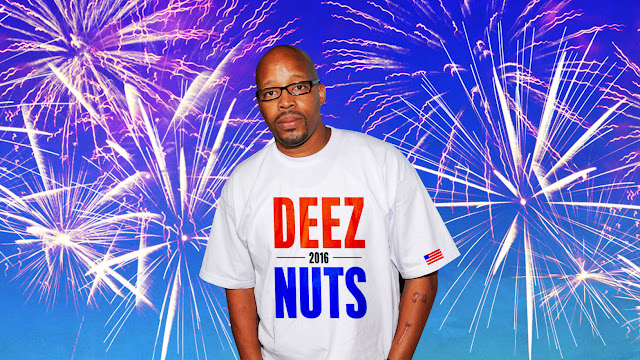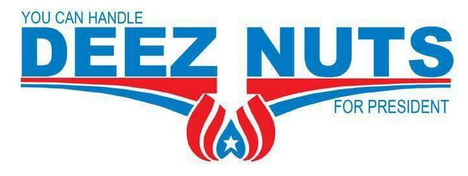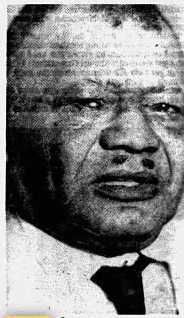Warren Griffin III, November 10, 1970 (Long Beach, Calif.) -
VP candidate for Independent (2016)
Running-mate with nominee: Brady C. Olson (b. ca2000)
Popular vote: ? (0.00%)
Electoral vote: 0/538
The campaign:
A candidate using the name "Deez Nuts" filed as an Independent for US President with the FEC in July 2015. Shortly after, it was revealed the true identity of this politician was 15-year old Brady Olson of Wallingford, Iowa.
Olson's campaign was given a boost when Public Policy Polling included Deez Nuts in surveys and the joke candidate did surprisingly well. Deez Nuts came to represent the multitude of choices for protest votes.
The Deez Nuts campaign website indicated that the nomination from several parties would be welcome--
Political Party Nominations I Am Considering Running For
American Populist Party
Citizens Party
Independence Party
Justice Party
Moderate Party
Modern Whig Party
Reform Party
Rent Is Too Damn High Party
The official Deez Nuts platform was actually quite sober in tone in contrast to the silly name of the standard bearer--
Illegal Immigration -- I believe that anyone who is found as an illegal immigrant in this country must be deported back to their country of origin, with the lone exception of being a minor.
Federal Budget & Government Spending -- I believe that the US Government should not be allowed to spend more than it makes from tax revenue. The reason we are in a budget crisis is because the two main parties refuse to compromise on this issue. Every federal official in either Congress, President, or the Cabinet, should immediately have their salary cut in half. Once the budget is balanced, those salaries may slowly rise. If the budget returns negative, salaries go back to where they started.
Abortion & Same-Sex Marriage -- I feel that as equal human beings that we should be allowed to choose how to live our lives without being discriminated by one another. At the same time however, I also understand that people believe that Christian religion outweighs government policy. But America is no longer mainly Christian. It is Christian, Jewish, Islam, Hebrew, and many others.
Foreign Policy -- I support the work that John Kerry and the State Department did with the Iran nuclear deal, considering it took nearly two years to reach this point. Everyone wants a better deal, but that's the whole point of negotiating. Look at your wants, then their wants, and meet in the middle. Now is the time being respected instead of feared by other nations. I also feel that we need to stop being a world watchdog and limit our positions in international conflicts.
Energy -- I support cutting subsidies to oil companies and giving tax incentives to individuals and corporations that implement green technology and renewable energy sources into their communities. I also support giving grants to communities for the purpose of installing municipal wind turbines, hydroelectric dams, and rooftop solar panels.
The Economy -- I support giving corporations tax incentives for the sole purpose of creating jobs IN America TO Americans FOR Americans. This will in turn stimulate the economy and make us more self-sufficient instead of relying on products from foreign countries.
Territorial Voting Rights -- I support giving citizens in our American territories voting rights. I also support giving American Samoan citizens automatic US citizenship. I would give Puerto Rico 3 electoral votes since Puerto Rico is bigger than many states. Guam, the US Virgin Islands, and the Northern Marianas all get 2 since they are smaller, but still incorporated territories. Finally, American Samoa would only get 1 since it is still considered an "unincorporated" territory. This would bring the total of electoral votes from 538 to 548. I also support giving all 5 territories plus Washington, D.C. 1 seat in the House of Representatives instead of non-voting delegates. This would bring seats in the House from 435 to 441.
The term "Deez Nuts" apparently traces back to a skit performed by rapper Warren G. (Warren Griffen III) in 1992 for Dr. Dre's The Chronic album. Feline Presidential candidate Limberbutt McCubbins, who was Olson's original inspiration for also filing as a flippant candidate, was the first choice as a running-mate for Deez Nuts. But it seems the cat turned him down, but no problem-- Deez Nuts' campaign was enthusiastically endorsed by Warren G., who offered himself as the VP. Olson had a Facebook entry on Aug. 21, 2015 that picked up the offer and ran with it, "The Nuts/G ticket? - Would be an honor to have Warren as vice prez!"
Warren G. has his own political agenda, including education and prison reform, "These people going to jail for life for bullshit. You maybe stole a bag of chips (on your third strike) and get jail for life. Let's start providing better schools so they can learn and get a job so they don't have to steal."
Olson offered a political prediction on Feb. 9, 2016--
My prediction:
Cruz VS Sanders for the presidency.
If Cruz runs with Trump as VP he will win.
If Sanders runs with Clinton as VP he will win.
If Biden runs he beats all.
OK, so he was four years too early.
By Election Day Olson was called "the former candidate" in the press. As he explained on Facebook, Nov. 9, 2016, "I almost became a felon! In August (Just after PPP released a poll showing that Green Party candidate Jill Stein was trailing me in Texas) The Federal Election Commission sent me a letter calling for me to withdraw from the race. '...may pursue or refer action for false filing.' So I withdrew. Hey, I almost lost voting rights before I could vote! Well, next up I will run for Congress — when I am eligible — in 2024! Sky is the limit after that!" In the event of their victory, there would have been a Constitutional problem with Olson being not even half the required age to assume office.
2016 was a record Presidential election cycle for the number of outrageous candidates filing with the FEC, with Deez Nuts being among the most prominent in that category. The Aug. 18, 2016 FEC press release stated--
FEC Adopts Interim Verification Procedure for Filings Containing Possibly False or Fictitious Information
WASHINGTON – The Federal Election Commission today announced an interim procedure staff will follow to verify information in filings from the 2016 election cycle that appear to be unlawfully false or fictitious. The new procedure comes in response to an increase this election cycle in the filing of registration and statement of candidacy forms (FEC Forms 1 and 2) that provide patently false candidate or treasurer names, questionable contact or bank information, or material that does not relate to campaign finance, such as drawings, essays and personal court records.
The Commission has authorized staff to send verification letters to filers listing fictional characters, obscene language, sexual references, celebrities (where there is no indication that the named celebrity submitted the filing), animals, or similarly implausible entries as the name or contact information of the candidate or committee. These letters will:
notify the filer of the potential penalties for false filings with a federal agency;
note the seemingly false information (candidate name, contact information, etc.) that was filed on the relevant Statement of Organization (FEC Form 1) or Statement of Candidacy (FEC Form 2);
direct the filer to file a letter either confirming or withdrawing the filing, or to file an amended Form 1 or 2, within 30 days of the date of the verification letter;
indicate that withdrawing the filing or failing to respond to the verification letter will lead to the Form 1 or 2 being removed from the searchable candidate/committee filings database on the Commission’s website; and
note that removal of the filing from the Commission’s searchable database does not waive the Commission’s authority to pursue or refer action for false filing under 52 U.S.C. Section 30109(a) or otherwise report such filings under 52 U.S. C. Section 30107(a)(9).
A staff working group will devise and recommend a prospective solution for the Commission’s consideration and implementation in conjunction with the Reports Analysis Division’s Review and Referral Procedures approval process for the 2017-2018 election cycle.
Election history: none
Other occupations: rapper, record producer, owner of Sniffin Griffins BBQ
Notes:
CBS News ranked the Deez Nuts campaign as the 14th "Wildest Moment" of the 2016 Presidential election season.































